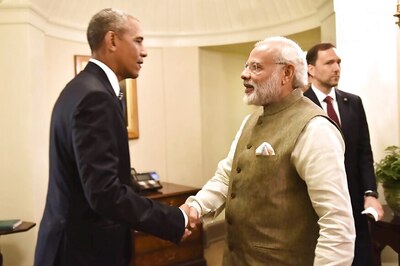
views
The perpetual ignorance under the garb of science and modernity has been the bane of modern society. One of the biggest issues of the post-colonial era is the colonial standards of acceptance of what is true and what isn’t. The colonial lens is discriminatory in nature. The traditional knowledge system of the world which has for eternity served humankind has been rejected majorly by the post-colonial societies. The modern commercial world with all the profiteering around modern medicine is driven by vested interests groups, trying to suppress any versions of cheap medicines derived from traditional knowledge.
The science of Ayurveda has been one of the worst affected by these vested interest groups. The acceptability of Ayurveda in the post-colonial era has been adversely affected by colonial prejudices. The rejection of ancient knowledge without any scientific explanation has been one of the hallmarks of the post-colonial world. The western academia heavily indoctrinated by colonial institutions, through multiple systems like literature review, peer-review journals and others, have monopolised the scientific space and created hurdles in rejuvenation of ancient science and medicine as an alternative to modern medicines.
However, the truth around the effectiveness of ancient medicine like Ayurveda as remedial medicine is slowly coming to the fore. This has been largely possible with practitioners of traditional methods of medicine breaking through the modern jargons of scientific protocols established by the West and reclaiming their scientific heritage. Today, the acceptability of Ayurveda is growing among people. This has been amplified by the effectiveness of Ayurveda for a variety of diseases and more so on COVID-19 patients.
Ayurveda in itself is a profound science and is one of the earliest of the traditional systems of medicine the world over. Ayurveda is part of the rich heritage of Bharat. Earliest references to Ayurveda are found in Rigveda. However, a more systematic elaboration of Ayurveda is found in the works of Charaka and Susruta. The medicinal system of Ayurveda which has cured the Bharatiya since time immemorial is based on preventive care depending on daily regimes (Dinacharya) and seasonal regimes (Ritucharya). The science in itself is plant-based.
In Ayurveda, there are 15 signs to indicate whether the body is healthy or not. Not just in texts but Ayurveda is practiced in everyday lives. From our food habits to our love for nature, Ayurveda resonates in our actions. Ayurveda focuses on all three aspects of human existence, i.e., the body, mind and spirit. Today, small Ayurvedic practices like drinking warm water with honey in the morning is a part of our daily lives. Ayurveda has been found to be effective in keeping skin healthy, stress reduction, increasing body metabolism, among other things. It helps live a healthy and disease-free life.
In terms of medical application, Ayurvedic medicines and herbs have been found to be effective against a variety of diseases. There is a raging debate in Bharat as well as the world over on the effectiveness of Ayurveda over the modern medicine industry. Even during COVID, the debate continued when Ayurvedic practitioners claimed the effectiveness of Ayurveda in treating COVID patients. Modern medicine practitioners didn’t like the claim and demanded more research into the matter.
Recently, research around Ayurveda has revealed how it can complement the modern medicinal system even though both vary in their application. One of the primary differences between Ayurveda and modern biomedicine is that Ayurveda is focused on the whole body system while modern biomedicine is focused on a specific organ or an ailment in the body. According to research, Ayurveda with all the modern medicine protocols has been found to be effective against treatment of Rheumatoid Arthritis and Osteoarthritis in knee. The concept of ‘Rasayana’ in Ayurvedic medicines for immune modulation and healing has been found to be effective in the treatment of Rheumatoid Arthritis and Osteoarthritis. Ayurveda has also been found to be effective in the treatment of chronic diseases where modern biomedicine has not been effective. Even during the pandemic waves in Bharat, Ayurveda helped in treatment of COVID patients. Ayurveda medicines were found to be effective in preventive treatment of COVID-19 as Rasayana botanicals of Ayurveda medicine have the potential of inhibiting the replication of SARS-CoV-2. With the application of Ayurvedic medicines, patients were found to have recovered as early as two days after they were diagnosed with COVID-19.
Ayurveda provided an alternative mechanism of treating COVID-19, over and above modern medicine. Ramdev’s Coronil was hailed as the first ‘proof-based’ drug to fight COVID. Though it attracted several rebuttals and backlash from the medical fraternity, the medicine finally got WHO certification and began to be exported to over 158 countries. To formalise the medicine according to global norms, the team of Patanjali also published a study in a leading medical journal to emphasise how Coronil expedited recovery in COVID-19 patients. This paved the way for other Ayurvedic practitioners in the country to produce Ayurvedic medicine for treatment of COVID-19. Another Ayurvedic medicine Ayurcoro-3 has been clinically tested and found to be effective on COVID-19 patients. Ayurcoro-3 was observed to significantly shorten the duration of COVID-19 infection. Ayurcoro-3 consists of Gomutra (bos indicus distilled ark), hot water, turmeric (haridra churna), potassium alum (Turati churna), candy sugar (khadi sakhar), bos indicus milk, among other ingredients. Ayurcoro-3 has already helped more than 1.5 lakh people in their fight against coronavirus. The doctors of Bhaktivedanta Hospital and Research Institute have also endorsed the effectiveness of Ayurcoro-3. The effectiveness of Ayurcoro-3 also highlights the medicinal usage of Gomutra.
It is high time the world starts accepting the marvel of Ayurveda. For long, the ignorance of the West has been detrimental to a healthy human society due to non-acceptance of traditional systems of medicine like Ayurveda as mainstream preventive care. Barriers such as lack of literature source and lack of awareness about Ayurveda should no longer be a hindrance to the acceptance of the ancient science, which has helped heal humans since eternity.
The acceptance of Ayurveda as a mainstream medicinal practice will help in proper knowledge transfer and also play a pivotal role in advancement of herbal drug research. Ayurveda has already proved to be effective against chronic diseases, arthritis as well as against COVID. The acceptance of remedial benefits of Ayurveda will help the humankind. It is high time we accept the benefits of our ancient knowledge. It is high time to accept Ayurveda as an eternal panacea.
The author is Executive Chief Communication Officer, Vishwa Samvad Kendra, Mumbai; Advisor, VESIM Literati Festival, Mumbai, Khajuraho Literature Festival, Prabuddha Bharat, Belagavi. The views expressed in this article are those of the author and do not represent the stand of this publication.
Read all the Latest Opinions here



















Comments
0 comment